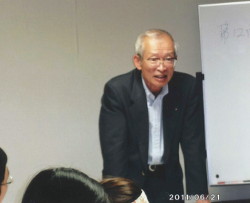International Exchanges-1
Frontier of International Exchange
Hisakazu Takagi(Graduate of 1964)
qEditorfs noter
Takagi made a speech on June 21 at Doshisha University.
He was a former Deputy Mayor of Kyoto City, and now he is a Chairman of Advanced Scientific Technology & Management Research Institute of KYOTO.
What does being ginternationalh essentially mean? Instead of a straight answer to this question, a discussion is generally made about some examples such as international persons, companies, cities, or countries. As many people have experienced, quite a lot of time, is spent excitedly for such a discussion. It is also interesting that the discussion is made to compare with others. For example, most participants speak in comparison with other universities not only in Japan but also in other countries, when discussing whether the Doshisha University is ginternationalh or not. In other words, it is a kind of examination to evaluate how ginternationalh Doshisha is.
To avoid such endless examination on international quality, I would like to focus my discussion on people. Thinking of the present situation of the world, international understanding is the most important. People need two common methods, at least, to understand each other. One is a common language, as a matter of course, and it is generally English. The other is logics which are more important but more difficult for most Japanese.
Many meetings of various levels are held every day in the world. People talk, discuss, debate and argue officially or personally. They do not always reach some agreement but they often come to an understanding of differences among the attendants. People are not free from their national backgrounds such as politically, economically, socially, religiously, or culturally. The recognition of mutual differences surely nourishes an understanding and friendship.
Unfortunately we, the Japanese are not ready for a logical debate. We do not like to answer gnoh to most of the questions we are asked. In the English language, however, all simple questions are expected to be answered as gyesh or gnoh. When the Japanese answer neither gyesh nor gnoh, the questioner hardly understands what the answer means. We do not want to hurt anyone by apparent objection or refusal. It comes from the Japanese cultural background. Japanese often understand each other even in silence but silence means nothing to foreign people. They may not agree with us, but we must try our utmost logical efforts to let them know the differences. When we talk about such differences, just be reminded that it is neither your difference nor my difference. It is the difference between the two of us.
An important domestic problem is instantly an important global issue nowadays. The accident of the Fukushima nuclear power plant is a typical example. Everybody says that the necessity of nuclear energy must be discussed all over the world.
This is an issue which needs one definite answer through serious debates. We, the Japanese people, must realize what we need are not emotional comments but rather logical abilities to such debates. In addition, we must listen very carefully to others if we want to be logical and persuasive.
Owing to the kind participants of the meeting on June 21st, the model debate on the necessity of nuclear energy was quite interesting. Let us learn to be logical. Let us listen carefully to our opponents to hold good logics. Let us insist on whatever we believe is right. The door to democracy and good understanding will be open to make our world happier.

